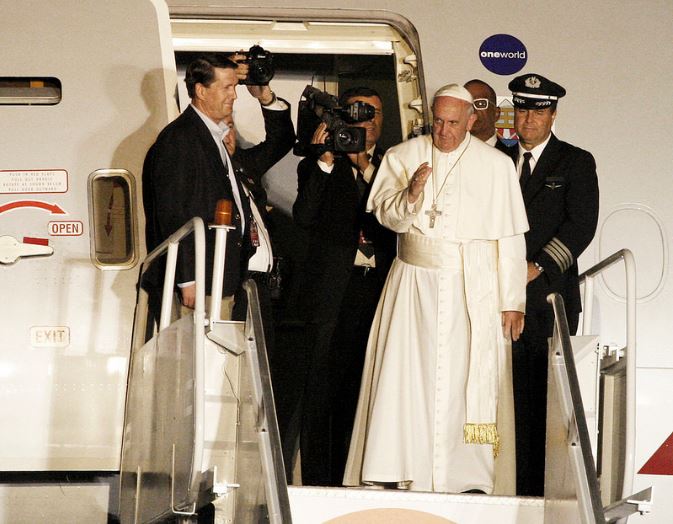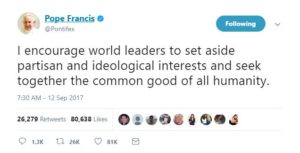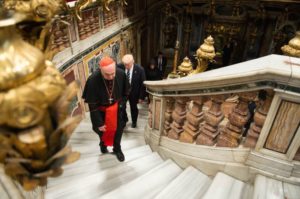
Washington, Havana, and Rome: A Tale of Three Cities
Since taking over the Papacy in 2013, Pope Francis has become one of the most popular Popes in the recent era, winning high marks from Catholics and non-Catholics across the globe. However, high levels of popularity aren’t enough to ensure success for the Vatican in the foreign policy realm, and as US tensions rise with Cuba, there’s no guarantee that the Pope will step in to help move that relationship forward.
Pope Francis’ attempts to connect with the everyday Catholics via Twitter, policy changes, and trips abroad have won him praise as a public diplomacy icon – he’s made the Center for Public Diplomacy’s list of top ten public diplomacy actors multiple times. But in reality, his influence is more limited than it seems.

Pope Francis periodically uses Twitter to share his thoughts on international affairs
The end goal of increasing soft power is to affect change in the international realm, and examples of the Vatican’s ability to do that are few and far between. Despite the Pope’s outspokenness on issues such as climate change, immigration policy, and nuclear disarmament, his only notable success has been from Cuba, where he capitalized more on the work of past Popes than on his own newfound global popularity.
Although then-President Barack Obama credited Pope Francis with playing an integral role in brokering negotiations, Vatican officials were quick to point out that it was his predecessors, John Paul II and Benedict XVI, who laid the groundwork in the region through years of quiet diplomacy. Pope Francis has done a uniquely good job of enhancing the image of the Catholic Church. However, it is unlikely that the people of either country were impacted by the Pope to the extent that his popularity became a relevant factor in negotiations. As of 2014, Pope Francis had yet to visit either the US or Cuba; his influence was limited to his interactions with top US and Cuban officials.
Once the Pope’s role in the Cuban detente is separated from his global popularity, one can more clearly see the options for the US-Cuba relationship going forward.
Since President Trump took office, relations with Cuba have been deteriorating, even more so in recent weeks. In August, news broke that US diplomats in Cuba had been victims of mysterious sonic attacks that left 22 Americans with symptoms ranging from headaches to memory loss. In response, President Trump ordered all nonessential personnel to evacuate and suspended the processing of Cuban visas. On Tuesday, the administration announced that it would be expelling 15 Cuban diplomats from the US, citing a failure of the Cuban government to sufficiently protect American diplomatic staff. In addition, the administration has issued a warning for tourists traveling to Cuba, which has been bad news for Cuba’s tourism industry.
This isn’t the first time the President’s actions have negatively affected Cuban businesses – he tightened restrictions on Cuban travel and trade in June 2017. All of these actions can be seen in the broader context of scaling back relations with the island nation.
What role, if any, is left for the Pope in this environment? Not much of one. It is unlikely that the Pope will be able to take on the same role that he played in 2014. The major players are different – President Obama has been replaced with President Trump – and the relationships are different as well – Pope Francis has criticized Trump’s policy on several occasions. No matter how the US-Cuba relationship progresses, it will likely be without the influence of the Pope.

President Trump takes a tour of the Vatican following his 2017 meeting with Pope Francis
The Cuba situation demonstrates the fragile ability of the Vatican to truly affect international affairs. Facilitating traditional diplomacy may have worked for the Holy See on one occasion, but it is unclear whether that will be a viable option going forward.
Time will tell if the Pope’s brand of public diplomacy will pay off in the long run. But as of right now, the Vatican has yet to pack the diplomatic punch it needs if it wants to see its foreign policy goals become a reality.





